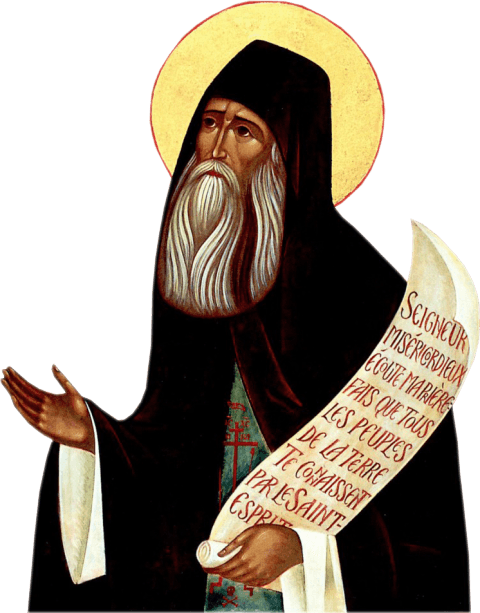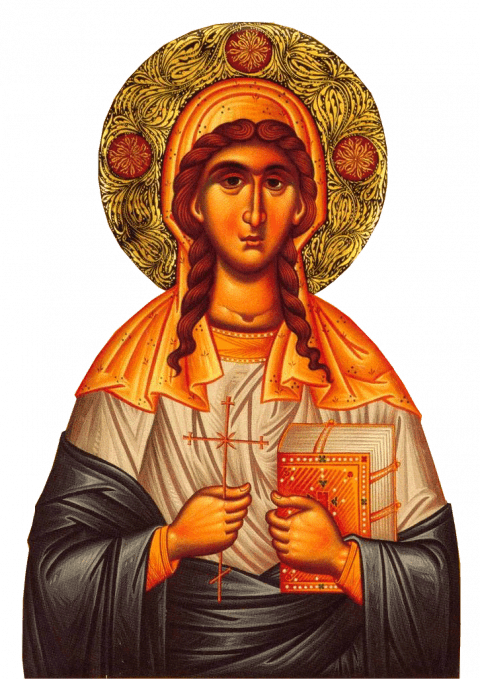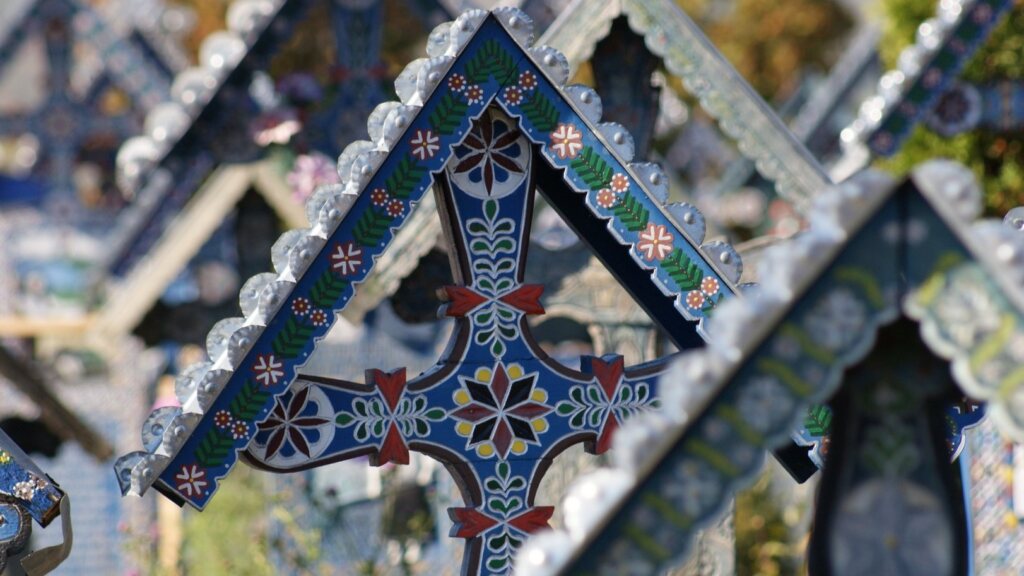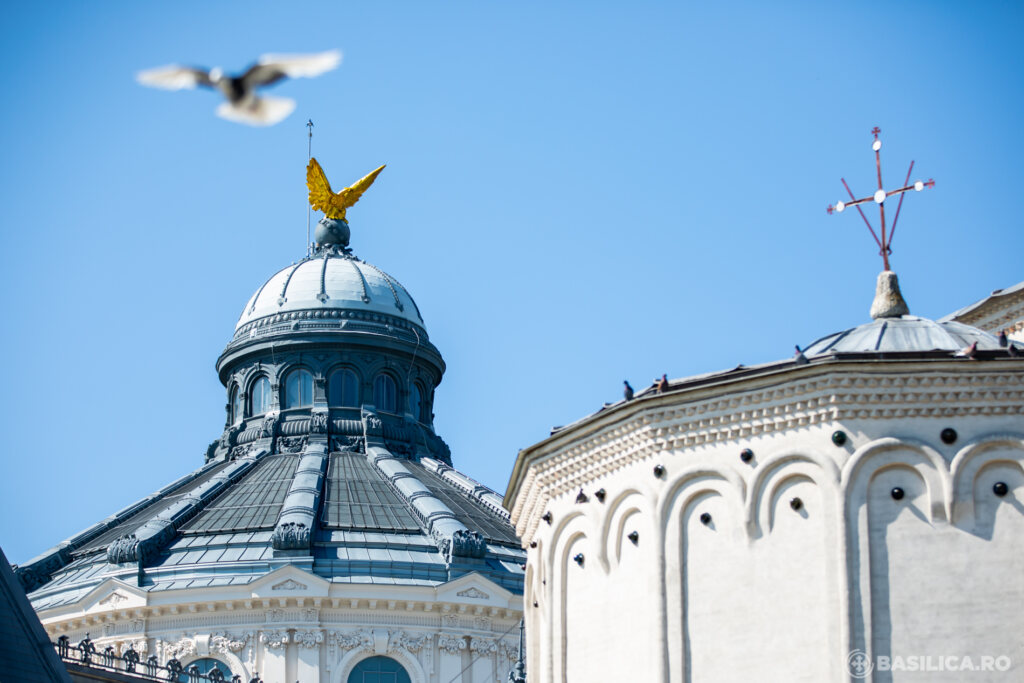Holy Protomartyr and Equal of the Apostles Thekla
She was born in the city of Iconium. She was the daughter of rich and illustrious parents, and she was distinguished by extraordinary beauty.
At eighteen years of age they betrothed her to an eminent youth. But after she heard the preaching of the holy Apostle Paul about the Savior, Saint Thekla with all her heart came to love the Lord Jesus Christ, and she steadfastly resolved not to enter into marriage, but rather to devote all her life to preaching the Gospel.
Saint Thekla’s mother was opposed to her daughter’s plans and insisted that she marry her betrothed. Saint Thekla’s fiancé also complained to the prefect of the city about the Apostle Paul, accusing him of turning his bride against him. The prefect locked up Saint Paul in prison.
During the night Saint Thekla secretly ran away from her house, and she bribed the prison guards, giving them all her gold ornaments, and so made her way into the prison to the prisoner. For three days she sat at the feet of the Apostle Paul, listening to his fatherly precepts. Thekla’s disappearance was discovered, and servants were sent out everywhere looking for her. Finally, they found her in the prison and brought her home by force.
At his trial Saint Paul was sentenced to banishment from the city. Again they urged Saint Thekla to consent to the marriage, but she would not change her mind. Neither the tears of her mother, nor her wrath, nor the threats of the prefect could separate Saint Thekla from her love for the Heavenly Bridegroom, the Lord Jesus Christ.
Her mother in a insane rage demanded from the judges a death sentence against her unyielding daughter, and Saint Thekla was sentenced to be burned. Without flinching, the holy martyr went into the fire and made the Sign of the Cross over herself. At this moment the Savior appeared to her, blessing her present deed, and inexpressible joy filled her holy soul.
The flames of the fire shot up high, but the martyr was surrounded by a light and the flames did not touch her. Thunder boomed, and a strong downpour of rain and hail extinguished the fire.
The torturers scattered in fear. Saint Thekla, kept safe by the Lord, left the city and with the help of a certain Christian youth, searched for the Apostle Paul. The holy apostle and his companions, among whom was Saint Barnabas, were hidden in a cave not far from the city, praying fervently, that the Lord would strengthen Saint Thekla in her sufferings.
After this, Saint Thekla went with them preaching the Gospel in Antioch. In this city she was pursued by a certain dignitary named Alexander, who was captivated by her beauty. Saint Thekla refused his offer of marriage, and so she was condemned to death for being a Christian. Twice they set loose hungry wild animals upon her, but they would not touch the holy virgin. Instead, they lay down meekly and licked her feet.
The Providence of God preserved the holy martyr unharmed through all her torments. Finally, they tied her to two oxen and began to chase her with red-hot rods, but the strong cords broke asunder like cobwebs, and the oxen ran off, leaving Saint Thekla unharmed.
The people began shouting, “Great is the God of the Christians!” The prefect himself became terrified, realizing that the holy martyr was being kept safe by the Almighty God, Whom she served. He then gave orders to set free the servant of God Thekla.
With the blessing of the Apostle Paul, Saint Thekla then settled in a desolate region of Isaurian Seleucia and dwelt there for many years, constantly preaching the Word of God and healing the sick through her prayer.
Saint Thekla converted many pagans to Christ, and the Church appropriately names her as “Equal- to-the-Apostles.” Even a pagan priest, trying to assault her purity and punished for his impudence, was brought by her to holy Baptism.
More than once the Enemy of the race of man tried to destroy Saint Thekla through people blinded by sin, but the power of God always preserved this faithful servant of Christ.
When Saint Thekla was already a ninety-year-old woman, pagan sorcerers became incensed at her for treating the sick for free. They were unable to comprehend that the saint was healing the sick by the power of the grace of Christ, and they presumed that the virgin-goddess Artemis was her special helper.
Envious of Saint Thekla, they sent their followers to defile her. When they came near her, Saint Thekla cried out for help to Christ the Savior, and a rock split open and hid the holy virgin, the bride of Christ. Thus did Saint Thekla offer up her holy soul to the Lord.
The holy Church glorifies the Protomartyr Thekla as “ the glory of women and guide for the suffering, opening up the way through every torment.”
From of old many churches were dedicated to her, one of which was built at Constantinople by the holy Equal of the Apostles Constantine (May 21). The Protomartyr Thekla, a prayerful intercessor for ascetics, is also invoked during the tonsure of women into monasticism.
Troparion — Tone 4
You were enlightened by the words of Paul, O Bride of God, Thekla, / and your faith was confirmed by Peter, O Chosen One of God. / You became the first sufferer and martyr among women, / by entering into the flames as into a place of gladness. / For when you accepted the Cross of Christ, / the demonic powers were frightened away. / O all-praised One, intercede before Christ God that our souls may be saved.
Venerable Silouan the Athonite
He was a monk of the early twentieth century at the Monastery of St. Panteleimon known for his wise counsel. He is remembered by the Church on September 24.
Saint Silouan was born Simeon Ivanovich Antonov in 1866 to Russian Orthodox parents who came from the village of Sovsk in Russia’s Tambov region. At the age of twenty-seven, he left his native Russia and came to Mount Athos, where he became a monk at the Monastery of St. Panteleimon and was given the name Silouan, the Russian version of the Biblical name Silvanus.
An ardent ascetic, he received the grace of unceasing prayer and saw Christ in a vision. After long years of spiritual trial, he acquired great humility and inner stillness. He prayed and wept for the whole world as for himself, and he put the highest value on love for enemies. Thomas Merton, a twentieth-century Catholic monk, described Silouan as “the most authentic monk of the twentieth century.” St Silouan died on September 24, 1938. He was glorified by the Ecumenical Patriarchate in 1987.
Though barely literate, he was sought out by pilgrims for his wise counsel. His writings were edited by his disciple and pupil, Archimandrite Sophrony. Father Sophrony has written the life of the saint along with a record of St. Silouan’s teachings in the book Saint Silouan the Athonite.
Troparion — Tone 4
On the path of humility, / by your prayers you received Christ as your Master. / In your heart the Holy Spirit witnessed to your salvation. / Therefore all people called to live in hope rejoice and celebrate your memory! / Holy Father Silouan, pray to Christ God to save our souls.
Troparion — Tone 2
O all-blessed Father Silouan, / flaming zealot of the seraphim’s love for the Lord / and fervent imitator of Jeremiah who wept for the people, / hearing the call of the Mother of the Lord of Hosts, / with wise courage you spewed out the sinful serpent / and withdrew from the snares of the world to the mountain of Athos, / where in labors and prayer, joined with tears, / in abundance you acquired the grace of the holy Spirit with which our hearts are enflamed. / Being strengthened by you, we cry out with compunction: / My Lord, my Life and the Joy of your saint, / save the world and us from all cruel things!

Tr by oca.org






